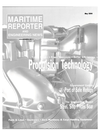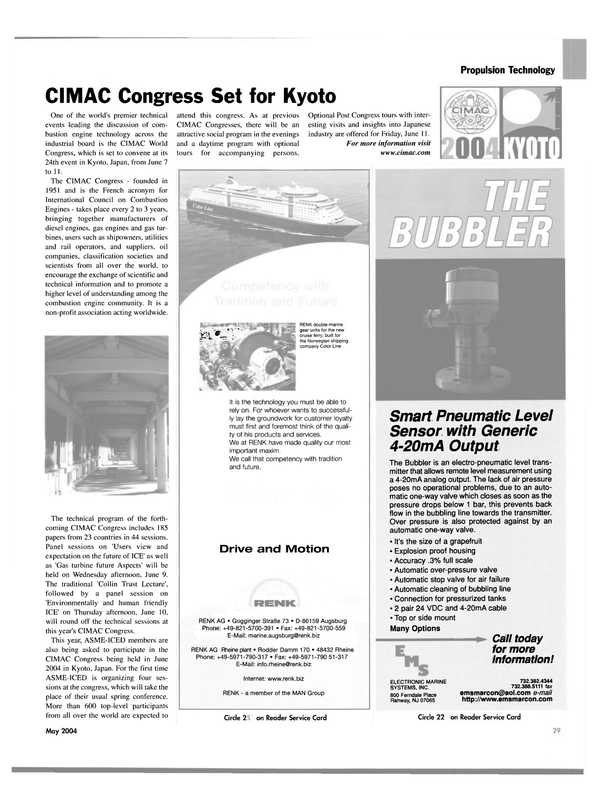
Thordon COMPAC Finds Success in FSV
To ensure that fish populations could be studied effectively, Oscar Dyson, a new Fisheries Survey Vessel (FSV) built for the NOAA was recently delivered featuring many advanced noise suppression technologies, including Thordon COMPAC Water Lubricated Propeller Shaft Bearings.
Built by VT Halter Marine Oscar Dyson is designed to play a vital role in maintaining the health of the northern Pacific fishing industry. The ship will use a variety of techniques — including hydroaccoustic surveying — to collect the essential data required to establish accurate quotas. A ship measuring 210 x 49 x 28 ft. (64 x 15 x 8.5m) would normally generate enough background noise to hinder surveying ops.
Therefore, achieving a low acoustic signature was a critical design parameter right from the start. According to the vessel specifications, the stern tube bearing needed to be "of environmentally safe and acoustically inefficient materials." In addition to being acoustically stealthy, Oscar Dyson is also equipped with DPS. The DP coordinates the thrusters and main shaft to effect the station keeping duty and hold the vessel in one position. Starts, stops and low shaft speeds are necessary to maintain the vessel at a precise geographical coordinate.
When a ship operates in this manner, shaft squeal is the noise generated when the shaft is operated at slow speeds and is literally trying to stick to the bearing. Noise will radiate from the vessel into the water. COMPAC's inherent self-lubricating properties and hydrodynamic design are designed to keeps breakaway friction low which helps to eliminate stick slip effects.
Circle 36 on Reader Service Card
Read Thordon COMPAC Finds Success in FSV in Pdf, Flash or Html5 edition of May 2004 Maritime Reporter
Other stories from May 2004 issue
Content
- Fincantieri Delivers Westerdam page: 10
- "World's Largest" Heavy Lift Ship Enters Service page: 10
- Damen Delivers Pair of Tugs page: 10
- Not Just Another Dam Ship page: 12
- Welsh Towing Company Growth Continues page: 14
- Gladding-Hearn Starts Construction of New I neat Vessel page: 15
- Despite 11% Increase, Hempel Disappoints page: 15
- Grimaldi-Naples Receives GM Award page: 16
- Schlueter Promoted to VP page: 17
- Misplacing the Place of Refuge page: 20
- Schottel Broadens Electric Propulsion Options page: 26
- CIMAC Congress Set for Kyoto page: 29
- Waterjets for a Difficult Design Task page: 30
- New Shaft Seal from Ocean Venture Seals page: 31
- Gas Turbines: Keeping Fresh With Innovation page: 32
- MAN B&W Diesel Debuts the New S65ME-C page: 33
- Thordon COMPAC Finds Success in FSV page: 33
- Wartsila to Power Australian FPSO page: 34
- VSP: Same Power, 9% More Bollard Pull page: 35
- The New MTU 2000 CR Marine Engines page: 36
- Converting and Repowering One Very Big Ship page: 38
- Power for a New Breed of RoPax page: 40
- ZF Helps to Harness Spirit of Ontario's Power page: 41
- Greece Poised for Posidonia 2004 page: 42
- Leif Hoegh Records Strong First Quarter page: 43
- BV Launches LNG CAP page: 43
- Steel, Ship Prices Soar as Tankers Stay Firm page: 44
- Ice Class & Large Ships Pose New Challenges page: 44
- Royal Caribbean Stays Current with C-MAP CM-93/3 ECs page: 46
- JRC Proposes Integrated Nautical Safety System page: 46
- C-Map's RTU and the Ending of the Paper Trail page: 47
- AutoChief C20 Reports Good Market Penetration page: 48
- Vision FT IBS page: 48
- Research Winches for R/V Maria S. Merian page: 52
- Konecranes Giving Port Efficiency a Lift page: 52
- Chinese Yard Logs Strong Month page: 55
- Fuel Oil Separation Takes Center Stage page: 56
- Security of Ports and Vessels: A New Approach page: 60


